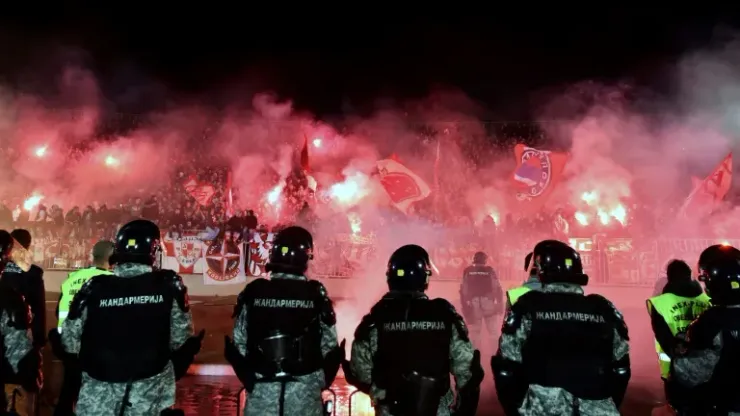Belgrade (AFP) – An “Eternal Derby” tainted by ultranationalism: the recurring duel between Belgrade’s Partizan and Red Star, which next takes place on Saturday, has become more about hooligans and police than sport.
Nowadays a pretext for clashes between supporters of the rival teams, the event was for a long time a celebration of Yugoslav football, which had a certain romantic aura despite a lack of trophies.
But that golden era of football collapsed with the breakup of Yugoslavia in the bloody conflicts of the 1990s.
In the stadiums filled with Red Star’s “Gypsy” supporters and the “Gravediggers” cheering Partizan, paramilitaries were recruited who went on to commit atrocities.
Warlord Zeljko Raznatovic, known as Arkan, found men for his “Tigers” paramilitary unit in Red Star’s Marakana stadium.
“Good football has been replaced by bad play and hooligans,” said bitter teacher and Red Star fan Nikola Jankovic, 58, who like many others stopped going to matches in the early 1990s.
On Saturday, like every derby day, Belgrade will resemble a battlefield. Helicopters will fly over the city and thousands of riot police will be deployed.
But away from the stadiums and matches, leading supporters from both sides regularly make news.
At the end of 2016, top Partizan fan Aleksandar Stankovic was assassinated in his car, in what appeared to be a mafia settlement.
“The rivalry does not have much to do with sport, it is linked to criminality,” said Mihajlo Todic, football journalist for the Sportski Zurnal newspaper.
In the streets of Belgrade are murals of deceased young men who “are not martyrs of sport, but victims of a quite different type of settling of accounts,” he said.
– Nostalgia for better times –
Former player and Red Star legend Vladimir Petrovic, known as Pizon (Pigeon), nostalgically remembers the time when he went by foot to the stadium for the derby battle.
“After a victory, you walked the streets like a hero,” he said.
Nothing could be better than winning the derby, not even winning the championship, added former Partizan coach Ljubisa Tumbakovic.
The clubs’ intense rivalry emerged from the creation of two clubs in the aftermath of World War II, replacing pre-war clubs that had disappeared in the conflict.
Red Star inherited many players and the stadium of the Yugoslavia club, while Partizan, created and directed by the army, played their first season in the compound of BSK, another former club of the capital.
Whether you become a Gypsy or a Gravedigger is not a personal choice.
“Children support the club supported by their fathers,” said Sandra Radenovic, a sociologist at the physical culture faculty in Belgrade.
Certain regions formed bonds with clubs based on legendary players they produced.
Thus Zrenjanin in northern Serbia, where Partizan hero Nenad Bjekovic was born, is “black and white”, while western Ub is decked in red and white for giving Red Star Dragan Dzajic.
Red Star has more fans across the country — 48.2 percent of Serbians over the 30.5 percent who support Partizan, according to a poll conducted in 2008.
Red Star also won the first derby 4-3 in January 1947, and has since won 107 out of 241 contests, over Partizan’s 76 victories.
Partizan are consoled by the fact they won by the biggest margin, 7-1, in 1953, but have failed to match their eternal rival winning the European Cup Final in 1991.
On Saturday, Red Star could widen the gap to nine points in Serbia’s football league and advance to a 28th title. But in a very weak championship, nobody will really care.
In Serbia, football lovers are now more interested in Chelsea or Real Madrid than the derbies of the capital.
200+ Channels With Sports & News
- Starting price: $33/mo. for fubo Latino Package
- Watch Premier League, Women’s World Cup, Euro 2024 & Gold Cup
The New Home of MLS
- Price: $14.99/mo. for MLS Season Pass
- Watch every MLS game including playoffs & Leagues Cup
Many Sports & ESPN Originals
- Price: $10.99/mo. (or get ESPN+, Hulu & Disney+ for $14.99/mo.)
- Features Bundesliga, LaLiga, Championship, & FA Cup
2,000+ soccer games per year
- Price: $5.99/mo
- Features Champions League, Serie A, Europa League & Brasileirāo
175 Premier League Games & PL TV
- Starting price: $5.99/mo. for Peacock Premium
- Watch 175 exclusive EPL games per season






